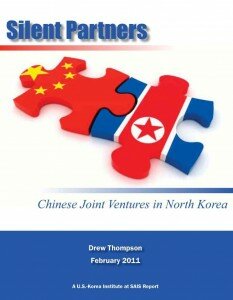 China is considered North Korea’s economic lifeline. Chinese aid, trade and investment is critical to North Korea’s social stability and economic productivity and a key source of technology and hard currency. Presumably, without this trade and investment, Kim Jong-il would lack the means to secure the allegiance of elites that support his rule, making trade and investment with China particularly important for ensuring the regime’s survival. Joint ventures with China are an important aspect of the bilateral relationship, because in addition to propping up the regime in Pyongyang, they contribute to economic development in China’s northeastern “rust belt.” These Chinese financial investments in the DPRK are geopolitically significant not only in terms of Chinese strategic interests but also for South Korean aspirations to unify the peninsula. Efforts by the international community to isolate North Korea and to impose sanctions in response to its efforts to develop nuclear weapons and its other provocative behaviors are complicated by the economic relationship between China and North Korea.
China is considered North Korea’s economic lifeline. Chinese aid, trade and investment is critical to North Korea’s social stability and economic productivity and a key source of technology and hard currency. Presumably, without this trade and investment, Kim Jong-il would lack the means to secure the allegiance of elites that support his rule, making trade and investment with China particularly important for ensuring the regime’s survival. Joint ventures with China are an important aspect of the bilateral relationship, because in addition to propping up the regime in Pyongyang, they contribute to economic development in China’s northeastern “rust belt.” These Chinese financial investments in the DPRK are geopolitically significant not only in terms of Chinese strategic interests but also for South Korean aspirations to unify the peninsula. Efforts by the international community to isolate North Korea and to impose sanctions in response to its efforts to develop nuclear weapons and its other provocative behaviors are complicated by the economic relationship between China and North Korea.
In the U.S.-Korea Institute at SAIS report, “Silent Partners,” Drew Thompson, Director of China Studies and Starr Senior Fellow at The Nixon Center, examines the status of Chinese joint ventures in North Korea and the role they play in the stability and security of the region.
Drew Thompson is the Director of China Studies and Starr Senior Fellow at The Nixon Center. Prior to joining The Nixon Center, he was the National Director of the China-MSD HIV/AIDS Partnership, an Assistant Director to the Freeman Chair in China Studies at the Center for Strategic and International Studies (CSIS), and the President of a Washington, D.C. company that manufactured snack food in Qingdao, China. Thompson also founded the American Chamber of Commerce Transportation and Logistics Committee in Shanghai and traveled China in both urban and rural areas. Thompson studied Chinese language at Beijing University in 1990, and was a graduate student in 1992 at the Johns Hopkins University Center for Chinese and American Studies in Nanjing, China. He graduated cum laude with a B.A. in Asian Studies from Hobart College in 1992. In 2004, he received an M.A. in Government, with a concentration in Homeland Security, from Johns Hopkins University.
DOWNLOADS
- Silent Partners: Chinese Joint Ventures in North Korea, Executive Summary (Feb 2011, 9 pps)
- Silent Partners: Chinese Joint Ventures in North Korea (Feb 2011, 88 pps)
- Transcript from Report Release Event (Feb 3, 2011)
See other USKI Publications



